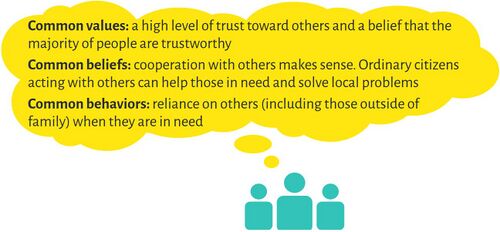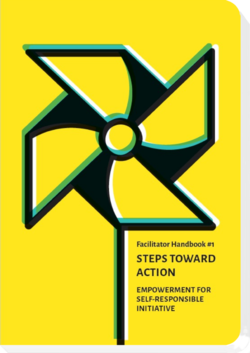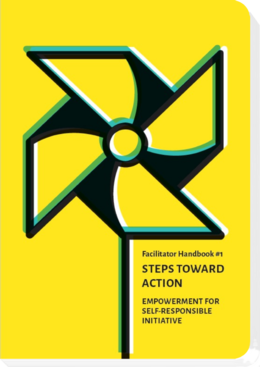Diverse motivations
When motivating others to take action, we tend to concentrate on the reasons we find the most appealing for ourselves. In doing so, we narrow the range of possible supporters, collaborative partners, and team members. Not only do we reduce our chances of motivating others, but the people who are motivated by our reasons generally resemble us. The less diverse the people involved, the less diverse their ideas, the smaller the representation of social groups, and the narrower the range of people that the ideas will reach.
Similar to other studies regarding the motivations for engagement a survey on voluntary work for social good in Polish society shows that there are three main sources of motivation:
- Egocentric (receiving long-term profits from social engagement)
- Empathetic (reducing others’ suffering)
- Normative (adapting to social rules)
The survey is also aimed at people who are not yet involved in volunteer services. When asked, “Which argument sounds like a convincing reason for taking civic action?” people answered as follows:
Moral values
Possibility of living one’s own values 78%
Enjoyment, satisfaction, a feeling of fulfillment 77%
Possibility of changing the world for the better 73%
Investment in the future
It could be useful to me and to my family 67%
Possibility of solving one’s own problems 62%
Direct profit
Possibility of gaining new competencies and experience in professional and private life 72%
Possibility of spending free time in an interesting way 65%
Possibility of developing interests and passions 64%
Social motivation
Feeling needed and helpful 83%
Possibility of cooperation with others 76%
Getting sympathy and respect from people 77%
Possibility of being in a group and making new contacts 77%
Expected Mutuality
If I help others now, later on others will help me 76%
Source: Klon/Jawor Association[1]
These results show that moral values and empathy are not the main motivators for people getting involved in activities for social good. To create a realistic picture of activism, it’s definitely necessary to present the variety of beneficial results, both for the beneficiaries of social engagement and for the activists themselves.
Depicting activism realistically
Toward a realistic (self-) description of an activist
Beyond altruistic motivations usefulness and profit are as well important and legitime motivations for engagement.
- Ask how your participants might gain from volunteerism personally.
- Reflect on the characteristics of your participants’ role models for activism. Discuss their altruistic and their egoistic aspects, as well as the pros and cons of their activities.
- Encourage participants to think about which expectations regarding the ethical characteristics of an activist they might fulfill, partly fulfill or not fulfill
People who aren’t involved in social engagement share often an idealistic picture of a person who is socially engaged. According to the survey, this is another intrinsic reason why people who consider themselves “normal” cannot imagine themselves in the role of a “super-person.” In order to bring this role into the scope of reality, facilitators need to take volunteers down from their imagined pedestal by creating a realistic image of them. They need to show them with all their doubts and points to improve upon, as well as their strengths, ideals, and learning goals.
In other cases activism and civil society engagement becomes discredited by governments or mass media. Activists live in a bubble which has not a lot to do with reality, they are helpful idiots for foreign powers or money laundry. They just want to get alimentation by foreign donors. Not suprisingly activists with altruistic motivations are quickly subject to a reality test and have to explain, justify or find alternative arguments. In this sense it's very helpful to have a realistic perception from the self, a perception that is more congruent with the way how others perceive the activists.
Marta Anna Gawinek-Dagargulia
Facilitator, coordinator of empowerment programs, author and program manager in the fields of cultural activism and civi education. Lives in Warsaw (Poland), head of SKORO association.
References
- ↑ Klon/Jawor Association: Zaangażowanie społeczne Polek i Polaków; Wolontariat, filantropia, 1% I wizerunek organozacji pozarządowych” 2013; Download in Polish language
Handbook for Facilitators: Steps toward Action
M. Gawinek-Dagargulia (ed.), N. Zimmermann (ed.), E. Skowron (ed.) (2016). Steps toward action. Empowerment for self-responsible initiative. Help your learners to discover their vision and to turn it into concrete civic engagement. Competendo Handbook for Facilitators.









